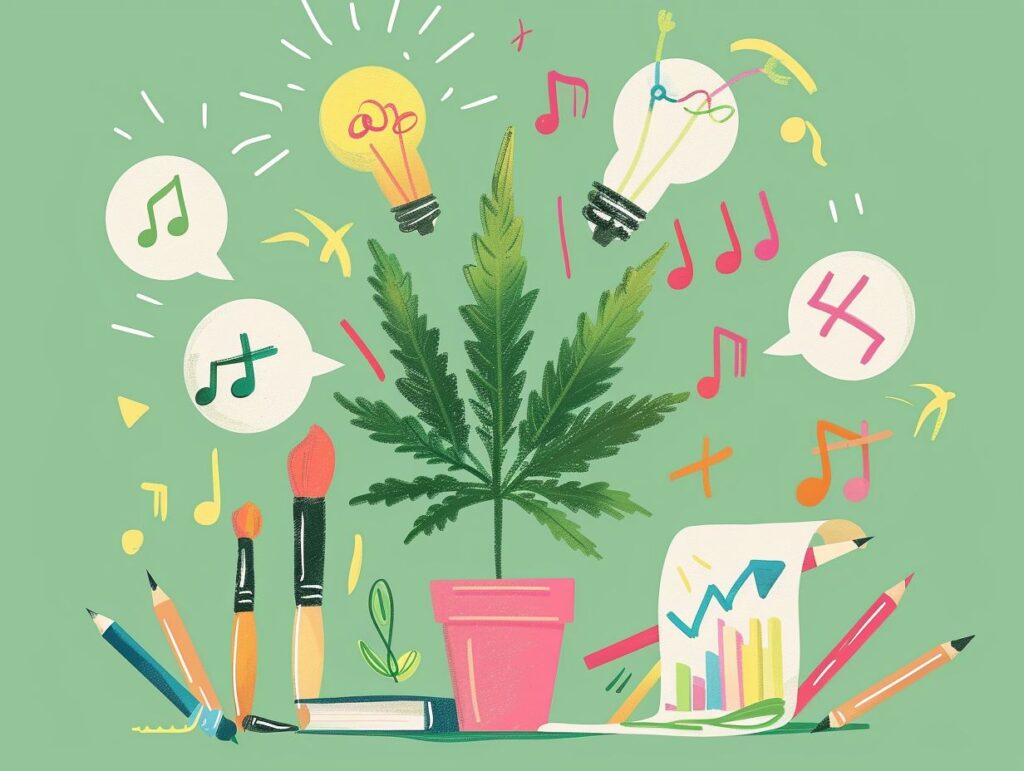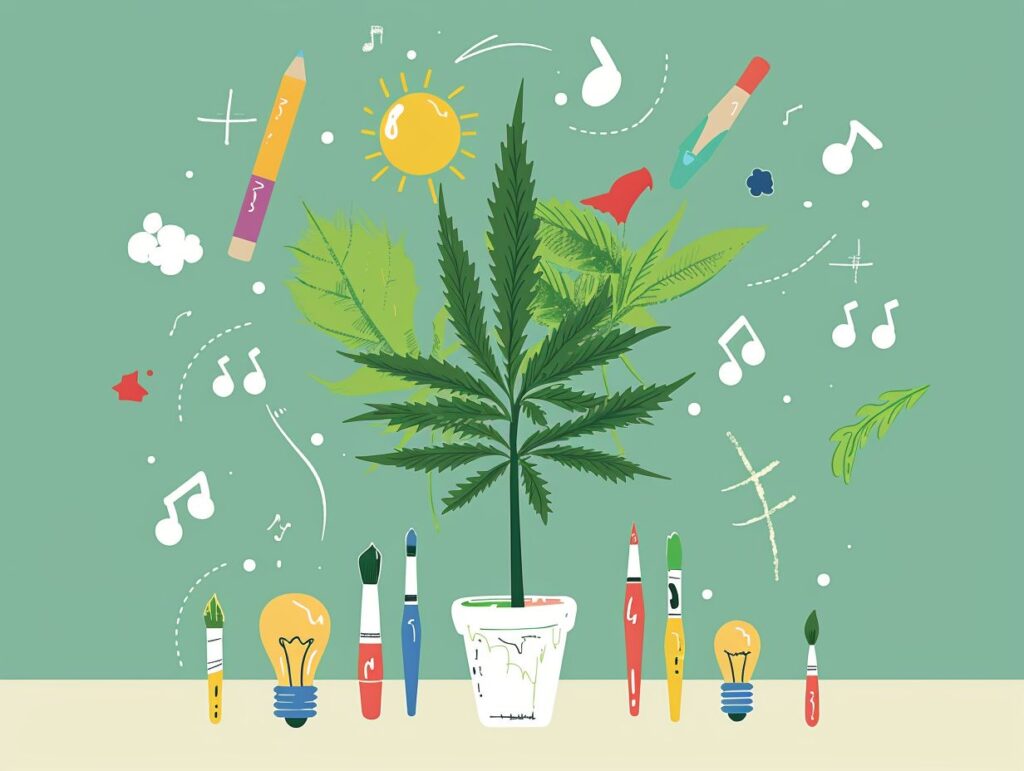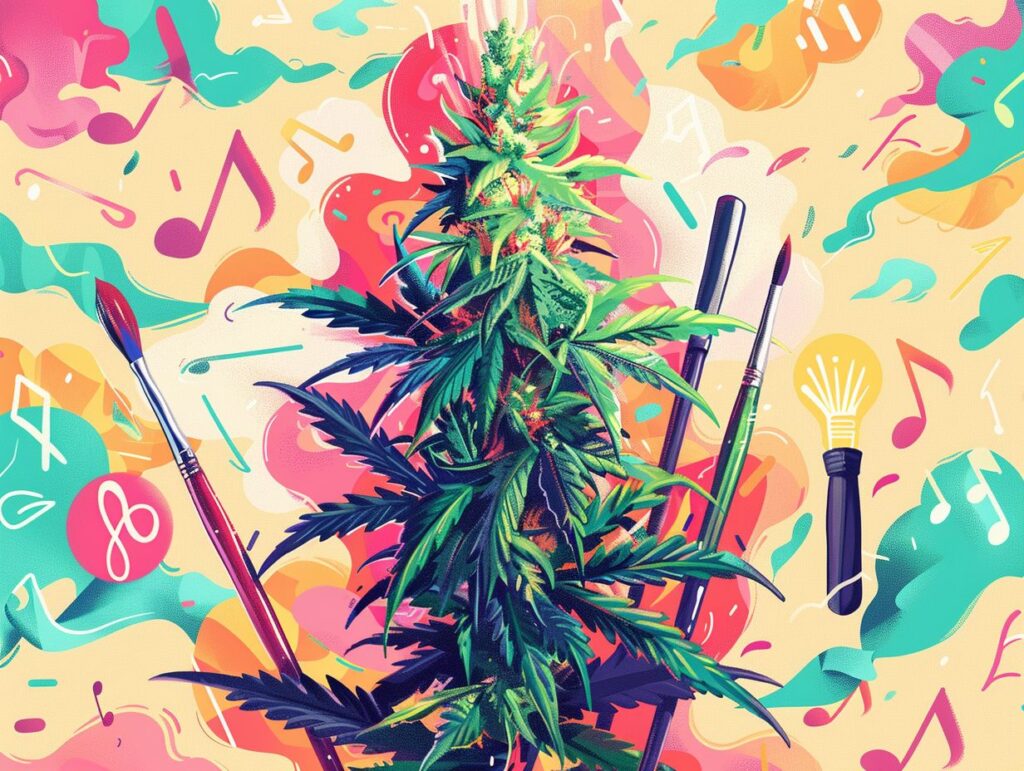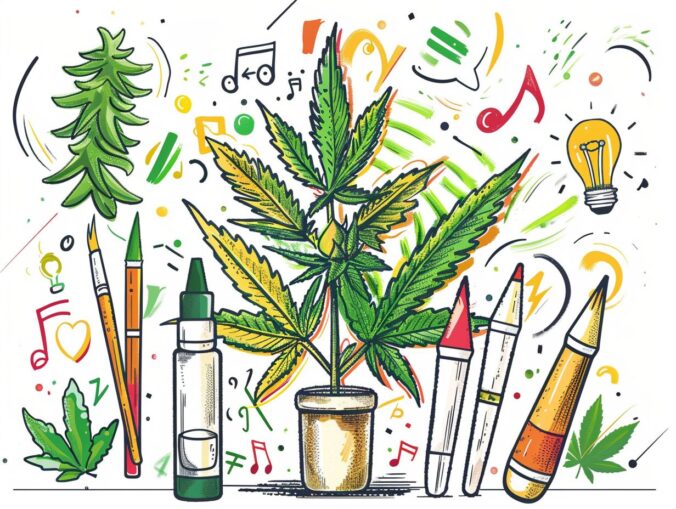Curious about the connection between cannabis and creativity?
We explore the different types of cannabis, debunk common myths, and dive into the science behind its impact on creativity.
From the role of THC and CBD to potential risks and benefits, we cover it all.
Whether you’re a seasoned cannabis user or just curious about its effects, this article provides valuable insights into how cannabis can enhance creativity.
What Are the Different Types of Cannabis?
Cannabis comes in different varieties categorized as Indica, Sativa, and Hybrid, each with unique characteristics and effects on the user.
- Indica strains are often associated with relaxing and sedative effects, making them popular choices for those seeking relief from pain or insomnia.
- On the other hand, Sativa strains are known for their energizing and uplifting properties, which can be beneficial for boosting creativity and enhancing mood.
- Hybrid strains combine elements of both Indica and Sativa, offering a balanced experience that may appeal to individuals looking for a combination of physical relaxation and cognitive enhancement.
These different types of cannabis can play a significant role in supporting artistic expression and overall well-being.
Indica
Indica cannabis strains are known for their relaxing and sedative effects, making them popular for nighttime use to unwind and improve mental state.
These strains contain high levels of CBD, a cannabinoid with known anxiolytic properties that can help reduce symptoms of anxiety and promote a sense of calm.
When consumed, Indica strains interact with the brain’s endocannabinoid system, influencing neurotransmitters like dopamine and serotonin, which play crucial roles in regulating mood and emotions. This interaction can lead to a reduction in stress and a general feeling of contentment, enhancing neurological creativity and allowing for a more peaceful and introspective mental state.
Sativa
Sativa strains of cannabis are often associated with a more energizing and uplifting experience, sparking creativity and inducing shifts in perception.
These effects of Sativa can be particularly beneficial for individuals looking to enhance their creativity and think outside the box. By promoting cognitive flexibility, Sativa strains can help individuals approach problems from different angles, leading to increased problem-solving skills and innovative solutions. This aspect of Sativa‘s influence plays a vital role in inspiring artistic exploration and pushing boundaries in various creative endeavors.
Hybrid
Hybrid cannabis strains combine characteristics of both Indica and Sativa, offering a balanced experience that can stimulate both analytical thinking and mindset shifts.
This unique blend not only enhances cognitive processes but also fosters artistic inspiration, allowing individuals to perceive their surroundings with heightened awareness and creativity. The nuanced effects of hybrids can lead to a profound shift in mindset, promoting introspection and novel perspectives.
Users often report an expansion of their artistic vision, finding new connections and sources of inspiration in their surroundings. Through cognitive enhancement and emotional nuance, hybrid strains serve as a gateway to exploring the deeper realms of creativity and self-expression.
What Are the Common Myths About Cannabis and Creativity?
There are several myths surrounding cannabis and creativity that often mislead individuals about the relationship between cannabis consumption and artistic expression.
One common myth suggests that cannabis can actually enhance creativity, leading many to believe that using marijuana can unlock hidden creative potential. Research does not definitively support this belief.
In fact, the effects of cannabis on creativity vary greatly among individuals, with some experiencing enhanced creativity while others may find their creative abilities hindered. It’s important to recognize that creativity is a complex process influenced by numerous factors, and attributing it solely to cannabis consumption oversimplifies the psychological impact of the substance.
Myth debunking about cannabis and creativity is essential to promote a more nuanced understanding of how substances interact with the creative process.
Cannabis Enhances Creativity
One of the prevailing myths is that cannabis directly enhances creativity and artistic expression, leading to a surge in art creation and innovative projects.
While some individuals may feel more relaxed or have heightened sensory experiences under the influence of cannabis, research suggests that its impact on cognitive processes is nuanced. While it can enhance certain aspects of artistic inspiration and exploration, the notion that it directly fuels creative output is not entirely accurate. Cannabis may influence divergent thinking, allowing for novel connections and ideas to emerge, but the true essence of artistic creativity often lies in the depth of cognitive creativity and the intentional exploration of one’s artistic vision.
Cannabis is a Gateway Drug to Harder Substances

Another misconception is that cannabis acts as a gateway drug, leading individuals to experiment with harder substances due to altered perception and neurological effects.
Research suggests that the concept of cannabis being a gateway drug is not as straightforward as once thought. Studies have shown that while cannabis can alter perception and affect neurological responses, it does not necessarily lead to increased experimentation with more dangerous substances. In fact, some findings indicate that cannabis use may even enhance cognitive flexibility and creativity in certain individuals, challenging the traditional narrative of it solely leading to risky behaviors.
Cannabis Causes Memory Loss and Brain Damage
One of the misconceptions is that cannabis consumption leads to memory loss and brain damage, affecting brain function and neurochemistry in detrimental ways.
Recent research has shown that the impact of cannabis on the brain is more complex than previously thought. While excessive and long-term use may affect memory and cognitive functions temporarily, it does not necessarily lead to permanent damage. In fact, studies have suggested that cannabis can have neuroprotective properties and may even stimulate neuroplasticity, the brain’s ability to adapt and reorganize itself.
Some compounds in cannabis have been found to have potential benefits for mental health, such as alleviating symptoms of anxiety and depression by modulating mood alteration and thought patterns.
What Does the Science Say About Cannabis and Creativity?
Scientific research has delved into the effects of cannabis on creativity, uncovering its potential for innovation and the creative benefits it offers to individuals.
Studies have shown that cannabis can trigger a shift in cognitive processes, leading to unconventional thinking patterns and enhanced problem-solving abilities. This alteration in perception plays a vital role in stimulating creativity by allowing individuals to approach challenges from new angles and generate novel ideas. Neurologically, cannabinoids present in cannabis interact with the brain’s endocannabinoid system, influencing areas associated with divergent thinking and ideation. This connection between cannabis consumption and creative expression continues to intrigue researchers, paving the way for a deeper understanding of the relationship between the two.
The Role of THC in Creativity
THC, one of the primary compounds in cannabis, plays a significant role in mood alteration and can affect focus and attention.
Research suggests that THC can have complex effects on cognitive processes, including divergent thinking. Divergent thinking refers to the ability to think creatively and generate multiple solutions to a problem. THC may enhance divergent thinking in some individuals by altering brain activity and loosening cognitive associations, leading to novel ideas and perspectives. This creativity boost may come at the expense of focus and concentration for certain tasks, as THC can also lead to distractions and difficulty in maintaining a linear thought process.
The Impact of CBD on Creativity
CBD, another compound in cannabis, may influence creativity by enhancing divergent thinking and stimulating imagination.
This potential impact on creativity is closely linked to how CBD interacts with the brain. Research suggests that CBD may help regulate brain function, promoting a balance between convergent and divergent thinking processes. By modulating neural pathways, CBD could encourage a more fluid thought pattern and the ability to generate novel ideas. This modulation is thought to be particularly beneficial for individuals who struggle with cognitive rigidity or creative blocks. CBD’s influence on neurotransmitters like serotonin and dopamine may play a role in supporting imaginative thinking and boosting overall cognitive flexibility.
The Importance of Dosage and Strain
The dosage and strain of cannabis consumed can impact cognitive flexibility and analytical abilities, highlighting the need for responsible use.
When selecting a strain for consumption, individuals should consider how it may affect their problem-solving abilities and brain stimulation. For example, sativa-dominant strains are known for providing an energizing and uplifting effect, which can potentially enhance creativity and cognitive processes. On the other hand, indica strains may promote relaxation and a more sedative experience, possibly influencing analytical thinking in a different way. It is crucial to experiment with different dosages and strains to find what works best for enhancing cognitive functions while also being mindful of potential drawbacks.”
How Can Cannabis Enhance Creativity?
Cannabis can enhance creativity by inspiring new ideas, increasing productivity, and promoting innovative approaches to problem-solving.
It is widely believed that cannabis can help individuals tap into their artistic vision and think outside the box, as it has the ability to stimulate cognitive processes and open up different perspectives. Many users report feeling more imaginative and engaged with their creative endeavors after using cannabis, often breaking through mental blocks and finding fresh solutions to challenges. By loosening inhibition and fostering a sense of relaxation, cannabis can create a conducive environment for exploring unconventional ideas and pushing boundaries in the creative process.
Relaxation and Reduced Inhibition

This shift in perception and mindset can lead individuals to think outside the box and approach challenges from new angles. When inhibitions are lowered, creativity is often heightened, allowing for a more free-flowing exploration of ideas and possibilities. This altered state can enhance cognitive functions by promoting divergent thinking and boosting imaginative thinking processes. Such experiences can help individuals break through mental blocks, develop innovative solutions, and tap into latent talents and potentials.
Enhanced Sensory Perception
Cannabis may enhance sensory perception, leading to a heightened experience of art creation and stimulating cognitive processes.
Individuals who incorporate cannabis into their artistic exploration often report feeling more attuned to subtle details and emotions in their surroundings. This heightened sensory awareness can lead to a deeper connection with their creative endeavors, inspiring a sense of psychological creativity that fuels their artistic expression. By influencing sensory perception, cannabis might unlock new avenues for self-expression and innovation, allowing individuals to tap into unexplored realms of imagination and inspiration.
Increased Divergent Thinking
Cannabis has the potential to increase divergent thinking, allowing for more creative solutions, focused efforts, and expansive artistic exploration.
This neurological boost from cannabis can lead individuals to approach problem-solving in unique ways, breaking free from conventional thought patterns. By enhancing cognitive creativity, cannabis stimulates the brain to make connections between seemingly unrelated concepts, fostering innovative ideas and solutions.
The enhanced ability to focus that cannabis provides can aid individuals in immersing themselves deeply in their artistic endeavors, unlocking hidden layers of expression and pushing the boundaries of traditional creative boundaries.
What Are the Potential Risks of Using Cannabis for Creativity?
While cannabis can enhance creativity, it also poses risks such as impaired motor skills, negative impacts on memory, and the potential for dependence and addiction.
These risks are particularly concerning for individuals engaged in activities requiring precise cognitive processes and coordination, such as driving or operating heavy machinery.
Chronic cannabis use may lead to difficulties in retaining new information and recalling memories, affecting an individual’s ability to learn and perform tasks effectively.
Artists and creators may face artistic challenges when using cannabis, as the drug’s effects on cognition can hinder the creative process and limit the quality of their work.
Impaired Motor Skills and Decision Making
One of the risks of using cannabis is the impairment of motor skills and decision-making abilities, which can hinder cognitive processes and artistic challenges.
This impairment can lead to difficulties in performing tasks that require fine motor skills and quick decision-making. The effects of cannabis on cognitive processes can impact memory retention, problem-solving abilities, and overall mental clarity.
Despite some individuals finding creative inspiration through cannabis use, it’s important to acknowledge that excessive consumption can potentially disrupt cognitive functions critical for daily functioning. Therefore, moderation and mindfulness are key when considering how cannabis may influence one’s motor skills, decision-making, and cognitive processes.
Negative Impact on Memory and Focus
Cannabis consumption may have a negative impact on memory retention and focus, affecting cognitive creativity and problem-solving abilities.
Individuals who use cannabis may find that their ability to retain information is compromised, leading to challenges in maintaining focus and concentration. This can hinder critical thinking skills and diminish problem-solving capabilities, as the ability to process information may be impaired.
While some individuals may experience perception enhancement and creative inspiration from cannabis, others may struggle to channel their creative energy effectively, affecting their artistic expression.
Thus, while cannabis can potentially offer a temporary boost in perceived creativity, its overall impact on cognitive functions may present significant obstacles to achieving optimal mental performance.
Potential for Dependence and Addiction
Using cannabis carries the potential for dependence and addiction, impacting brain stimulation and potentially clouding artistic vision and innovative thinking.
The psychological impact of cannabis on cognitive functions is a complex topic. While some users may believe that it enhances their creativity or helps them think outside the box, there are risks involved.
Dependence on cannabis can lead to negative effects on cognitive processes such as memory, attention, and decision-making. This can hinder one’s ability to perform tasks that require mental acuity and focus, ultimately affecting their overall productivity and well-being.
Frequently Asked Questions

What is the relationship between cannabis and creativity?
There is a common belief that cannabis use can enhance one’s creativity, but the scientific evidence for this is mixed. While some people may feel more creative when using cannabis, others may experience a decrease in creativity. It ultimately depends on the individual and their unique brain chemistry.
Does cannabis make you more creative?
There is no definitive answer to this question as the effects of cannabis on creativity vary from person to person. Some individuals may feel more inspired and open to new ideas while under the influence of cannabis, while others may experience a decrease in creativity or feel too relaxed to engage in creative activities.
Can cannabis increase focus and concentration?
Contrary to popular belief, cannabis use can actually impair focus and concentration. While some strains may have a more stimulating effect, overall cannabis can make it difficult to concentrate and stay focused on a task. This is because cannabis affects the brain’s ability to filter out distractions.
Is there a specific strain of cannabis that is best for creativity?
There is no definitive answer to this question, as different strains of cannabis can affect each person differently. Some strains may make a person feel more relaxed and open to creative ideas, while others may cause a decrease in motivation and focus. It’s important to experiment with different strains to see which works best for you.
Are there any benefits to using cannabis for creativity?
While cannabis may not directly enhance creativity for everyone, there are some potential benefits that could indirectly contribute to creativity. For example, some individuals may use cannabis to help them relax and reduce anxiety, which could in turn free up mental energy and allow for more creative thinking.
What are some potential risks of using cannabis for creativity?
Like any substance, cannabis use comes with potential risks. Some people may experience negative side effects such as anxiety, paranoia, or decreased motivation when using cannabis. It’s important to use cannabis responsibly and in moderation, and to be aware of any potential negative effects it may have on your creativity or overall well-being.

